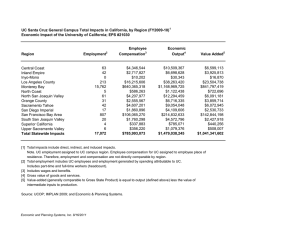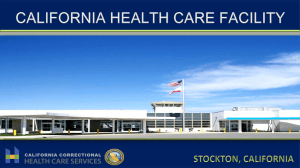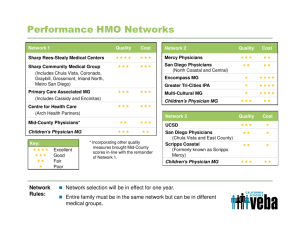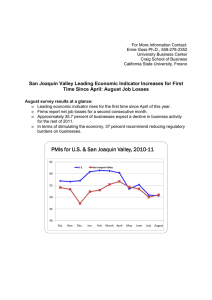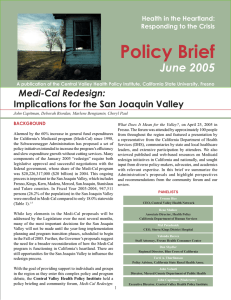IN BRIEF
advertisement
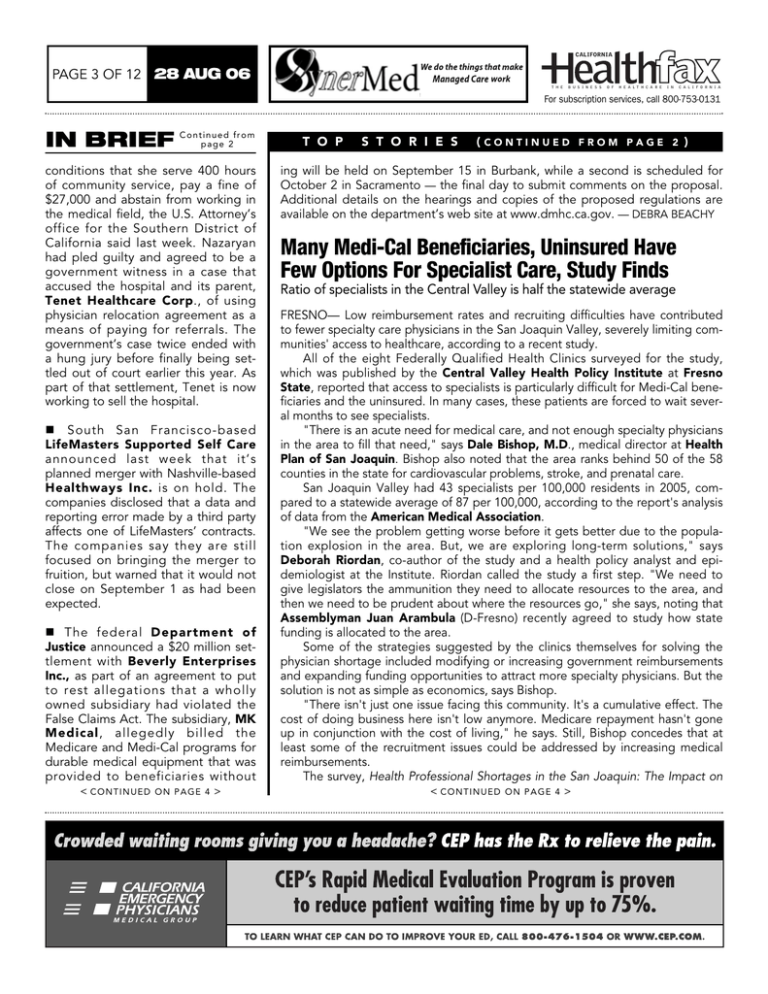
CALIFORNIA PAGE 3 OF 12 28 AUG 06 T H E B U S I N E S S O F H E A L T H C A R E I N C A L I F O R N I A For subscription services, call 800-753-0131 IN BRIEF C o n tpi naugeed2f r o m conditions that she serve 400 hours of community service, pay a fine of $27,000 and abstain from working in the medical field, the U.S. Attorney’s office for the Southern District of California said last week. Nazaryan had pled guilty and agreed to be a government witness in a case that accused the hospital and its parent, Tenet Healthcare Corp., of using physician relocation agreement as a means of paying for referrals. The government’s case twice ended with a hung jury before finally being settled out of court earlier this year. As part of that settlement, Tenet is now working to sell the hospital. T O P S T O R I E S (CONTINUED FROM PAGE 2 ) ing will be held on September 15 in Burbank, while a second is scheduled for October 2 in Sacramento — the final day to submit comments on the proposal. Additional details on the hearings and copies of the proposed regulations are available on the department’s web site at www.dmhc.ca.gov. — DEBRA BEACHY Many Medi-Cal Beneficiaries, Uninsured Have Few Options For Specialist Care, Study Finds Ratio of specialists in the Central Valley is half the statewide average The federal Department of Justice announced a $20 million settlement with Beverly Enterprises Inc., as part of an agreement to put to rest allegations that a wholly owned subsidiary had violated the False Claims Act. The subsidiary, MK Medical, allegedly billed the Medicare and Medi-Cal programs for durable medical equipment that was provided to beneficiaries without FRESNO— Low reimbursement rates and recruiting difficulties have contributed to fewer specialty care physicians in the San Joaquin Valley, severely limiting communities' access to healthcare, according to a recent study. All of the eight Federally Qualified Health Clinics surveyed for the study, which was published by the Central Valley Health Policy Institute at Fresno State, reported that access to specialists is particularly difficult for Medi-Cal beneficiaries and the uninsured. In many cases, these patients are forced to wait several months to see specialists. "There is an acute need for medical care, and not enough specialty physicians in the area to fill that need," says Dale Bishop, M.D., medical director at Health Plan of San Joaquin. Bishop also noted that the area ranks behind 50 of the 58 counties in the state for cardiovascular problems, stroke, and prenatal care. San Joaquin Valley had 43 specialists per 100,000 residents in 2005, compared to a statewide average of 87 per 100,000, according to the report's analysis of data from the American Medical Association. "We see the problem getting worse before it gets better due to the population explosion in the area. But, we are exploring long-term solutions," says Deborah Riordan, co-author of the study and a health policy analyst and epidemiologist at the Institute. Riordan called the study a first step. "We need to give legislators the ammunition they need to allocate resources to the area, and then we need to be prudent about where the resources go," she says, noting that Assemblyman Juan Arambula (D-Fresno) recently agreed to study how state funding is allocated to the area. Some of the strategies suggested by the clinics themselves for solving the physician shortage included modifying or increasing government reimbursements and expanding funding opportunities to attract more specialty physicians. But the solution is not as simple as economics, says Bishop. "There isn't just one issue facing this community. It's a cumulative effect. The cost of doing business here isn't low anymore. Medicare repayment hasn't gone up in conjunction with the cost of living," he says. Still, Bishop concedes that at least some of the recruitment issues could be addressed by increasing medical reimbursements. The survey, Health Professional Shortages in the San Joaquin: The Impact on < CONTINUED ON PAGE 4 > < CONTINUED ON PAGE 4 > South San Francisco-based LifeMasters Supported Self Care announced last week that it’s planned merger with Nashville-based Healthways Inc. is on hold. The companies disclosed that a data and reporting error made by a third party affects one of LifeMasters’ contracts. The companies say they are still focused on bringing the merger to fruition, but warned that it would not close on September 1 as had been expected. PAGE 4 OF 12 28 AUG 06 CALIFORNIA Medical Staff Leadership Seminars by The Greeley Company Visit www.greeley.com, or Call 800/801-6661 T H E B U S I N E S S O F H E A L T H C A R E I N C A L I F O R N I A For subscription services, call 800-753-0131 IN BRIEF C o n tpi naugeed3f r o m obtaining the proper claims or medical documentation. To settle the case, Beverly agreed to pay $14,487,278 to the federal government and $5,512,722 to California. No action was ever filed in court and Beverly did not admit to any wrong doing as part of the settlement. Emeryville-based California Emergency Physicians announced last week that it had won a contract to provide physician-staffing services at the Santa Clara Valley Medical Center’s Emergency Department and its Urgent Care Center. The hospital’s emergency department sees 40,000 patients a year, while the urgent care center treats another 25,000. The contract award was approved by the Santa Clara County Board of Supervisors. Federal anti-trust officials have cleared the way for two different healthcare deals to go forward. The Federal Trade Commission granted early termination of its review of Primedex Health Systems Inc. planned acquisition of Radiologix Inc., a Dallas-based operator of diagnostic imaging centers. The deal will boost Los Angeles-based Primedex’s network to 132 locations nationwide and would make it the nation’s largest owner and operator of fixed site diagnostic imaging centers. The FTC also cleared the proposed acquisition of HCA Inc. by a group of private equity firms and company executives. The $33 billion deal to take Nashville-based HCA private includes investments by Bain T O P S T O R I E S (CONTINUED FROM PAGE 3 ) Federally Qualified Health Clinics, included clinics in Fresno, Kern, Madera, Merced, San Joaquin, Stanislaus and Tulare counties, and was funded by a grant from The California Endowment. — KATHRYN MACKENZIE Blue Shield Assembles Bariatric Surgery Network Narrow network covers Southern California PPO beneficiaries SAN FRANCISCO— In light of the growing use of bariatric surgery to treat morbidly obese patients, Blue Shield of California last week unveiled plans to steer its PPO members in Southern California who need the procedure to a new network of 16 centers and 32 surgeons in nine counties across the region. Following the lead of other health plans in creating a narrow network for the high-cost procedure, Blue Shield says its compiled the list of approved centers after evaluating candidates on the basis of volume, outcomes and cost metrics. “We worked through the hospitals, but we let them know very clearly that we expected it to be a dual submission with both hospital and surgeon data,” says Michael-Anne Brown, M.D., a regional medical director for the plan. “So it’s not possible for a new surgeon to come in town or for a surgeon to switch their hospital affiliation and to suddenly be grandfathered in.” Brown says the criteria used to select the centers included mortality rates of less than one percent and a complication rate of less than 10 percent. Noting the difficulty of comparing complication rates among facilities due to a lack of a standardized method for risk-adjustments, Brown says it settled on a combined readmission/reoperation rate of less than 10 percent of a center’s cases. Currently, the narrow network is only for Blue Shield’s PPO members in Southern California, but Brown says it will likely be expanded statewide. Blue Shield’s HMO network is unaffected by the move, but Brown says it will work with its capitated medical groups to steer patients to the recognized facilities. The program takes effect January 1, 2007. — BRAD CAIN Aetna Expands Member Access To Quality, Pricing Data On Its Network Physicians Data is available in select markets, but may be expanded to California HARTFORD— Aetna members in over a dozen markets will now be able to get price and clinical quality and efficiency information about specific doctors on the company’s Web site— a movement that could be coming to California. “This is something we think all consumers should have access to,” says Aetna spokeswoman Elizabeth Sell. The company began making price information on physicians available a year ago in Cincinnati, Ohio. Now it is making available clinical quality and efficiency information in Cincinnati as well as a dozen < CONTINUED ON PAGE 5 > < CONTINUED ON PAGE 5 > Visit www.healthleadersmedia.com/careers to f ind the last 4 weeks of HealthFax Employment Opportunities

